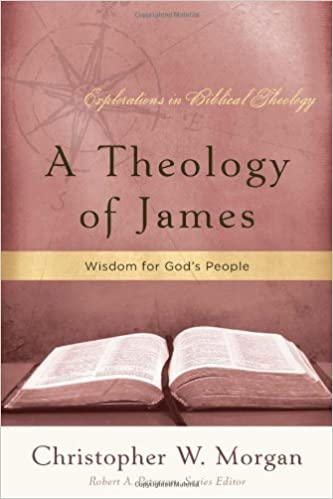A Brief Book Review from Books At a Glance
by Mark Baker
Christopher W. Morgan (PhD, Mid-America Baptist Theological Seminary) has written a delightful contribution to the Explorations in Biblical Theology series, edited by Robert A. Peterson. As a work in biblical theology, Morgan states that the book “seeks to demonstrate that while particular passages have important messages, biblical books also have larger, overarching messages that merit attention” (xvi).
Morgan argues that wisdom, consistency, and community stand out as three intertwining central themes in the book of James. Specifically, God gives wisdom in order to create consistency in the community of the people of God. Morgan maintains that this theme “works well as an integrating center because it makes sense of the obvious emphases of the letter and because it is intimately connected to and shapes other major themes in James: suffering, the poor and the rich, and speech” (42).
The book contains thirteen chapters that cover a broad spectrum of material including introductory matters, the poor, words, and law. There is also a chapter on the relationship between James and Paul, including a helpful overview of three major interpretive options. Chapter 11, “A Sketch of James’s Theology,” stands out as one of the most insightful chapters in the book. Morgan explains that the letter of James is both God-saturated and Christologically rich. He summarizes James’s theological trajectory: “God is one, the Father is God, Jesus is divine, the Father and Jesus are distinct, and the Father and Jesus exist in unity” (155). Furthermore, Morgan demonstrates how James’s understanding of God leads directly to his exhortation for the people of God.
The Explorations in Biblical Theology series aims to provide a “mid-range” approach between lengthy theology works and semi-popular books, and Morgan’s contribution represents this mid-range approach at its finest. Though the footnotes are now missing a decade of the most recent scholarship, they still provide substantial interaction from top commentaries to unpublished dissertations. The prose is imminently readable and quite pastoral without sacrificing scholarly nuance. My main quip with the book is that some connections between the topics in the chapters were left unexplored. Morgan developed his “intertwined central themes” in chapters 3-5 and put forward an excellent biblical-theology-in-miniature in chapters 11-12, but chapters 6-10 seemed less developed as they pertain to the “integrating center.”
Regardless of this minor complaint, pastors and educated laypeople will want to add this book to their personal library. It is a treasure-trove of theological insight that will help for a sermon series, a Bible study, or for personal devotion. Pastors should especially take note of this book. Sermon series on James often sound quite piecemeal; A Theology of James will help connect all the dots. Most importantly, it illuminates the relationship between the character of God and the ethical commands. If you want your study of James to be more God-saturated, look no further than this excellent book.
Mark Baker (PhD, Southeastern Baptist Theological Seminary) serves as professor and assistant director at the Scarborough College Darrington campus in Houston, TX.
Buy the books

A THEOLOGY OF JAMES: WISDOM FOR GOD’S PEOPLE, by Christopher W. Morgan